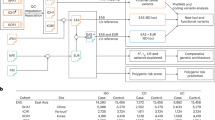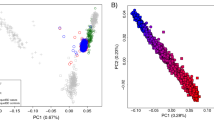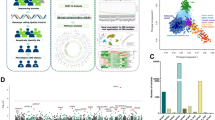Abstract
Genome-wide association studies have identified PHOX2B, FAM92B, IRGM and NCF4 as candidate susceptibility factors for ileal Crohn's disease (CD). Here we sought to determine whether these genes were also associated with ileal CD in New Zealand Caucasians, as well as with ileocolonic CD, colonic CD and ulcerative colitis (UC). A total of 507 CD patients, 475 UC patients and 576 controls were genotyped for the single nucleotide polymorphisms rs16853571 (PHOX2B), rs4821544 (NCF4), rs13361189 and rs4958847 (IRGM), and rs8050910 (FAM92B). NCF4 and IRGM were significantly associated with ileal CD (P-valuers4821544=0.0090, odds ratio (OR)=1.425, 95% confidence interval (CI): 1.092–1.859; P-valuers13361189=0.0017, OR=1.942, 95% CI: 1.274–2.959; P-valuers4958847=0.0022, OR=1.767, 95% CI: 1.224–2.558), but not with other forms of inflammatory bowel disease (IBD). No association of PHOX2B or FAM92B with IBD was detected. Our study has demonstrated that IRGM and NCF4 are ileal-specific CD susceptibility factors in New Zealand Caucasians.
This is a preview of subscription content, access via your institution
Access options
Subscribe to this journal
Receive 6 digital issues and online access to articles
$119.00 per year
only $19.83 per issue
Buy this article
- Purchase on Springer Link
- Instant access to full article PDF
Prices may be subject to local taxes which are calculated during checkout

Similar content being viewed by others
References
Baumgart DC, Carding SR . Inflammatory bowel disease: cause and immunobiology. Lancet 2007; 369: 1627–1640.
Mathew CG . New links to the pathogenesis of Crohn disease provided by genome-wide association scans. Nat Rev Genet 2008; 9: 9–14.
Fisher SA, Tremelling M, Anderson CA, Gwilliam R, Bumpstead S, Prescott NJ et al. Genetic determinants of ulcerative colitis include the ECM1 locus and five loci implicated in Crohn's disease. Nat Genet 2008; 40: 710–712.
Franke A, Balschun T, Karlsen TH, Hedderich J, May S, Lu T et al. Replication of signals from recent studies of Crohn's disease identifies previously unknown disease loci for ulcerative colitis. Nat Genet 2008; 40: 713–715.
Rioux JD, Xavier RJ, Taylor KD, Silverberg MS, Goyette P, Huett A et al. Genome-wide association study identifies new susceptibility loci for Crohn disease and implicates autophagy in disease pathogenesis. Nat Genet 2007; 39: 596–604.
Raelson JV, Little RD, Ruether A, Fournier H, Paquin B, Van Eerdewegh P et al. Genome-wide association study for Crohn's disease in the Quebec Founder Population identifies multiple validated disease loci. Proc Natl Acad Sci USA 2007; 104: 14747–14752.
Parkes M, Barrett JC, Prescott NJ, Tremelling M, Anderson CA, Fisher SA et al. Sequence variants in the autophagy gene IRGM and multiple other replicating loci contribute to Crohn's disease susceptibility. Nat Genet 2007; 39: 830–832.
Wellcome Trust Case Control Consortium. Genome-wide association study of 14, 000 cases of seven common diseases and 3,000 shared controls. Nature 2007; 447: 661–678.
Gearry RB, Roberts RL, Burt MJ, Frampton CM, Chapman BA, Collett JA et al. Effect of inflammatory bowel disease classification changes on NOD2 genotype-phenotype associations in a population-based cohort. Inflamm Bowel Dis 2007; 13: 1220–1227.
Roberts RL, Gearry RB, Hollis-Moffatt JE, Miller AL, Reid J, Abkevich V et al. IL23R R381Q and ATG16L1 T300A are strongly associated with Crohn's disease in a study of New Zealand caucasians with inflammatory bowel disease. Am J Gastroenterol 2007; 102: 2754–2761.
Silverberg MS, Satsangi J, Ahmad T, Arnott ID, Bernstein CN, Brant SR et al. Toward an integrated clinical, molecular and serological classification of inflammatory bowel disease: Report of a working party of the 2005 montreal world congress of gastroenterology. Can J Gastroenterol 2005; 19 (Suppl A): 5–36.
Simkins HM, Merriman ME, Highton J, Chapman PT, O′Donnell JL, Jones PB et al. Association of the PTPN22 locus with rheumatoid arthritis in a New Zealand Caucasian cohort. Arthritis Rheum 2005; 52: 2222–2225.
Xavier RJ, Podolsky DK . Unravelling the pathogenesis of inflammatory bowel disease. Nature 2007; 448: 427–434.
Volpp BD, Nauseef WM, Clark RA . Two cytosolic neutrophil oxidase components absent in autosomal chronic granulomatous disease. Science 1988; 242: 1295–1297.
Ellson CD, Davidson K, Ferguson GJ, O’Connor R, Stephens LR, Hawkins PT . Neutrophils from p40phox−/− mice exhibit severe defects in NADPH oxidase regulation and oxidant-dependent bacterial killing. J Exp Med 2006; 203: 1927–1937.
Massey D, Parkes M . Common pathways in Crohn's disease and other inflammatory diseases revealed by genomics. Gut 2007; 56: 1489–1492.
Lahiri DK, Nurnberger Jr JI . A rapid non-enzymatic method for the preparation of HMW DNA from blood for RFLP studies. Nucleic Acids Res 1991; 19: 5444.
Shi YY, He L . SHEsis, a powerful software platform for analyses of linkage disequilibrium, haplotype construction, and genetic association at polymorphism loci. Cell Res 2005; 15: 97–98.
Acknowledgements
We thank the people of Canterbury with IBD who generously gave of their time to take part in the study. We also thank Rhondda Brown and Judy Hoar for their assistance in coordinating the recruitment of patients to the Canterbury IBD cohort; Pip Shirley, Meagan Reilley, David Tan, Ramez Ailabouni and Charlotte Duncan for entering patient details into the clinical database; and Allison Miller and Melanie Allington for extracting DNA from the IBD patient samples. RLR is the recipient of a Sir Charles Hercus Health Research Fellowship. This study received financial support from the Health Research Council of New Zealand.
Author information
Authors and Affiliations
Corresponding author
Additional information
Supplementary Information accompanies the paper on Genes and Immunity website (http://www.nature.com/gene)
Supplementary information
Rights and permissions
About this article
Cite this article
Roberts, R., Hollis-Moffatt, J., Gearry, R. et al. Confirmation of association of IRGM and NCF4 with ileal Crohn's disease in a population-based cohort. Genes Immun 9, 561–565 (2008). https://doi.org/10.1038/gene.2008.49
Received:
Revised:
Accepted:
Published:
Issue Date:
DOI: https://doi.org/10.1038/gene.2008.49
Keywords
This article is cited by
-
Irgm1 regulates metabolism and function in T cell subsets
Scientific Reports (2022)
-
Regulation of eosinophil functions by autophagy
Seminars in Immunopathology (2021)
-
Genome-wide association study implicates immune activation of multiple integrin genes in inflammatory bowel disease
Nature Genetics (2017)
-
Rac Attack: Modulation of the Small GTPase Rac in Inflammatory Bowel Disease and Thiopurine Therapy
Molecular Diagnosis & Therapy (2016)
-
Association between NCF4 rs4821544T/C polymorphism and inflammatory bowel disease risk in Caucasian: a meta-analysis
Inflammation Research (2015)



